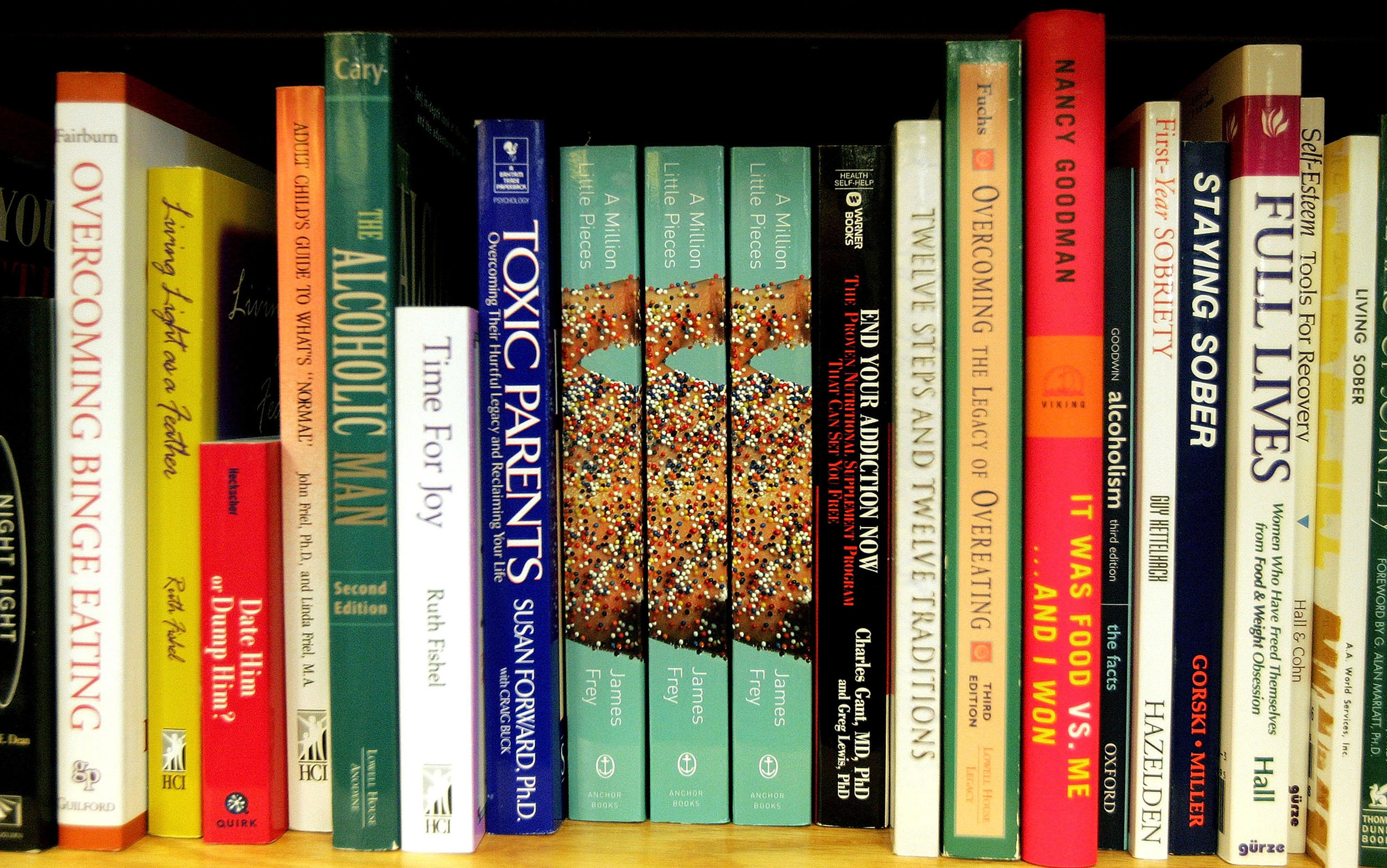‘Who wants to go first?’ It’s 2001. There are eight of us sitting in a circle. I’m in a support group for sufferers of social anxiety, which meets every Thursday evening in a corner of the Royal Festival Hall. It’s the one place where it’s OK for us to discuss the panic attacks, loneliness, inhibition and low self-esteem that people with social anxiety feel. The group is a raft, and we are slowly learning to paddle. There’s no therapist on board. One of the group downloaded an audio course in Cognitive Behavioural Therapy (CBT). For 10 weeks I have been listening to the voice of Dr Thomas Richards, a cognitive therapist from Phoenix, Arizona, and following his advice. ‘Acceptance is an active experience,’ Dr Richards tells me. ‘Acceptance is an active experience,’ I repeat to myself on the bus. ‘I refuse to let my negative thoughts bully me,’ says Dr Richards. ‘Refuse to let negative thoughts bully you,’ I write in my journal. I incant his handouts for 30 minutes each day, hoping that my flatmates don’t overhear me. But it seems to work. And then, on Thursday evenings, the group gathers to share our progress, and to practise exercises such as the ‘circle of death’. Some of us are getting better, for others it is slower. We keep paddling.
That support group was a lifesaver for me. I’d suffered from social anxiety and depression through my late teens and early 20s. After a few weeks of the group, I stopped having panic attacks, and over the next few years, the depression slowly departed. Life got better.
And the experience triggered a fascination with the origins of CBT. In March 2007, I travelled to New York to interview the pioneer of cognitive therapy, Albert Ellis, not long before he died. He’d trained as a psychoanalyst in the 1940s, but became frustrated with how little progress his clients made. He looked around for alternative ways to approach the emotions, and went back to his first love: ancient philosophy. One line particularly resonated with him, from the Stoic philosopher Epictetus: ‘Men are disturbed not by events, but by their opinion about events.’ Those 12 words launched the cognitive revolution in psychotherapy.
That revolution is now being embraced by national governments seeking to make the lives of their citizens happier, or at least freer from depression and anxiety. Five years ago, amid intense opposition from some part of the psychotherapeutic profession, the Labour government in the UK launched a programme called Improving Access to Psychological Therapies (IAPT). It aimed to train 6,000 new therapists in talking therapies — mainly CBT — by 2014, and to treat around one million people a year for depression and anxiety. As Nick McNulty, a therapist in the IAPT centres for Southwark and Lambeth in south London told me: ‘It is the biggest expansion of mental health services anywhere in the world, ever.’ A similar programme is also running in Sweden.
The stakes are high: for the workers of IAPT, this is a bold new experiment in bringing free therapy — and potentially a happier life — to millions of people who might otherwise never have got help. But some private therapists worry that the new service has been overhyped, and might give talking therapies a bad reputation with individuals and governments. Others say that the intimate, one-on-one relationship of psychotherapy is unsuited to the cold bureaucracy and number-crunching of a state-based system such as Britain’s National Health Service (NHS). And why does IAPT mainly offer CBT, while ignoring other therapeutic approaches? ‘A lot of therapists are hoping IAPT will fail,’ McNulty says.
What if governments started to take happiness data as seriously as they took unemployment or inflation?
One element that grates on many in the profession is the quantitative measurement of outcomes. Cognitive therapies have been interested in measurable results from the start, and governments have embraced the apparent ease with which changes in individual mood and happiness can be measured and monitored. The organisers of IAPT see themselves as introducing a new level of transparency and outcome-measurement into psychotherapy. Their opponents see this as a crude, even Orwellian, approach to the subtle nuances of an individual’s personal story.
At each session of therapy, an IAPT ‘service user’ is asked to fill in a questionnaire assessing how they feel and what progress they think they’ve made since the previous session. The forms help the therapist and service user keep track of the therapy, and the results are also fed, anonymously, into a vast national data pool that is accessible by anyone through the NHS Information Centre. This ‘emotions database’ makes it possible for anyone to search online and see outcome results by disorder, by treatment, by gender, by ethnicity, and by IAPT centre. It’s psychotherapy for the age of big data.
And it all started because of a chance meeting at a tea party.
Lord Richard Layard made his reputation as a labour economist in the 1990s at the London School of Economics. Layard specialised in unemployment and inequality, although he’d always had an interest in depression and happiness. Perhaps this was due to the influence of his father, the anthropologist John Layard, who suffered from severe depression, attempted suicide, was analysed by Carl Jung, and eventually retrained as a Jungian psychologist.
Lord Layard himself has always been more focused on hard data than on the collective unconscious: in the 1990s he become interested in a new field in economics that tried to measure individuals’ happiness and use the data to guide public policy. Layard wondered: what if governments started to take happiness data as seriously as they took unemployment or inflation? Any government that could provide a highly effective mental health service, improving the resilience and happiness of individuals, would raise the levels of well-being in the nation as much as other, more conventional, economic policies.
At a tea party for new Fellows at the British Academy in 2003, Layard struck up a conversation with the man standing next to him, David Clark. ‘It was a fortuitous meeting,’ Layard told me. Synchronicity, his father might have said. Clark was, in fact, a leading British practitioner of CBT: a professor of psychology at King’s College London and the director of the Centre for Anxiety Disorders and Trauma at the Maudsley Hospital, who had helped to set up a CBT trauma centre in Omagh in Northern Ireland, after the IRA bombing of that town in 1998. Clark explained to Layard that clinical and field trials of CBT showed recovery rates of around 50 per cent for depression and anxiety disorders. He also explained that there was very little CBT (or any other talking therapy) available via the NHS for common problems such as depression. Layard, nothing if not a doer, decided he wanted to ‘get something done about mental health’. So, at the age of 70, that is what he did.
With Clark’s help, he assembled a powerful argument for the British government to increase its spending on CBT. Depression and anxiety affect one in six of the UK population: mental health problems as a whole cause not only human suffering, but also an estimated £105 billion each year in lost productivity and incapacity benefits. Yet less than one per cent of the NHS budget was being spent on talking therapies, despite recommendations from the government’s own National Institute for Health and Care Excellence (NICE) to increase it. Layard and Clark recommended tripling this budget, and training 6,000 new therapists.
Ellis revived the Greeks’ idea that philosophy can teach us to, in Socrates’ phrase, ‘take care of our souls’
Layard and Clark’s recommendations were accepted by the re-elected Labour government in 2005 and put into action under Clark’s direction. In a radical move for the NHS, it allowed people to come to the service without first going through a GP. For mild cases of depression and anxiety, people would be treated by ‘psychological well-being practitioners’, who had a year’s training in CBT, and who would provide ‘psycho-education’ and guided self-help, often over the phone or online. For more severe cases, people were encouraged to ‘step up’ to more intensive face-to-face therapy for a longer period of time, with a fully trained therapist. Finally, IAPT centres would offer only government-endorsed, evidence-based therapies, which meant mainly CBT, and would measure outcomes at every therapy session, making this data available online, so that both patients and politicians could see the results.
The programme had a lot of enemies from birth, particularly among private therapists, for whom the new free service was a profound threat to their livelihood (just as many doctors had opposed the creation of the NHS in the early post-war period). Some were understandably indignant that NICE recommended only CBT for depression and anxiety, while ignoring many other therapeutic approaches, such as psychoanalysis. The British psychoanalyst and writer Darian Leader was vociferous in his criticism of the programme. CBT, he wrote in The Guardian in September 2008, was a shallow quick fix. It represented the triumph of the free market, although Leader also suggested that IAPT was reminiscent of Mao’s cultural revolution, in which the masses were forcibly indoctrinated in ‘right thinking’. Leader particularly disliked CBT’s emphasis on quantifiable evidence: ‘In today’s outcome-obsessed society,’ he wrote, ‘people must become countable, quantifiable, transparent’. Only the intimate, long-term therapeutic relationship envisioned by Sigmund Freud and his followers could offer genuine help to the neurotic. When I interviewed Leader for Psychologies magazine in September 2011, he warned that, as soon as therapists tried to meet political well-being targets, they would be simply ‘imparting the values of the state in the counselling room’.
In fact, the philosophical origins of CBT lie neither in Maoism nor in neoliberal capitalism but, as we have seen, in the ancient Greek philosophy of Stoicism. The Stoics believed that our emotions are inextricably linked to our beliefs, values and interpretations of the world. We can heal ourselves of emotional disturbances by learning to examine our unconscious beliefs and interpretations and to ask if they are accurate or wise. If not, we can choose to think differently, and our feelings will eventually follow. However, we are forgetful creatures, so we have to repeat our new, wise attitudes until they become habits of thinking. We also need to practise our beliefs, in real life, so that they become habits of behaviour.
When Albert Ellis became frustrated with psychoanalysis in the 1950s, he adapted many of the ancients’ techniques for changing the self: repeating maxims, keeping track of your progress in a journal, the emphasis on fieldwork or behavioural therapy. He called his approach Rational Emotive Behaviour Therapy, and launched it in 1955, founding the Institute for Rational Living in New York in 1959. Single-handedly, he revived the Greeks’ idea that philosophy can teach us to, in Socrates’ phrase, ‘take care of our souls’ — the literal meaning of the word ‘psychotherapy’, to heal the soul or spirit.
But Socrates and the Stoics believed that the ultimate purpose of philosophy was a religious one: to become completely free of attachments or aversions to external things, and at one with the divine. Ellis, a fervent atheist and advocate of free love, was more Epicurean. The goal of his therapy was to stop people beating themselves up so they could, as he famously put it, ‘have a fucking ball’. His iconoclastic approach made Ellis a famous and influential figure in modern psychology, but it was another psychologist, Aaron Beck, a professor at the University of Pennsylvania, who turned CBT into the all-conquering juggernaut it is today.
Beck developed CBT in the early 1960s. When I interviewed him in 2007, he told me that he was ‘also influenced by the Stoics, who stated that it was the meaning of events rather than the events themselves that affected people. When this was articulated by Ellis, everything clicked into place.’ While Ellis was content to be a freewheeling rebel, Beck was more of an institution-builder. He wanted to transform clinical psychotherapy from within, by building up a base of empirical evidence for cognitive therapy.
In a liberal, multicultural society, the state has no business telling us what the meaning of life is
Before Beck, evidence for psychotherapy mainly consisted of therapists’ case studies. The reputation of psychoanalysis, for example, was built on a handful of canonical case studies written up by Freud, such as ‘the Wolfman’, ‘Dora’, and ‘Anna O’. The problem with that approach was that the evidence was anecdotal, non-replicable, and relied strongly on the therapist’s own account of a patient’s progress. A therapist might exaggerate the success of a treatment, as Freud arguably did in the foundational case of Anna O in 1895.
Beck’s radical innovation was to develop a questionnaire that asked patients how they felt on a four-point scale. In 1961, he created the Beck Depression Inventory, a 21-question survey that measured a person’s beliefs and emotional state through questions such as:
0 I do not feel like a failure.
1 I feel I have failed more than the average person.
2 As I look back on my life, all I can see is a lot of failures.
3 I feel I am a complete failure as a person.
By measuring the intensity of a person’s negative beliefs and feelings, Beck discovered a way to quantify emotions and turn them into data. Using the Inventory, or BDI, he could quantify how a person felt before a course of CBT, and how he felt after it. According to the BDI, after 10 to 20 weeks of CBT, around half of people with depression no longer met the diagnostic criteria for major depressive disorder. And, crucially, this result was replicable in randomised controlled trials by other therapists. CBT showed similar recovery rates for anxiety disorders such as social anxiety and post-traumatic stress disorder.
Beck launched the era of ‘evidence-based therapy’. However, in doing so, he made some drastic alterations to the ancient philosophy that inspired both him and Ellis. He pruned out anything that was not scientifically measurable — including any mention of the Divine or the Logos, virtue or vice, the good society, or our ethical obligations to other people. I once asked Beck if he agreed with Plato that certain forms of society encouraged particular emotional disorders. He replied: ‘I am loath to toss out an opinion that is not based on empirical evidence.’ There is much about which CBT is silent. It teaches you how to steer the self, but does not tell you where you should steer it to, nor what form of society might encourage us to flourish.
Mass government sponsorship of CBT therapy, such as the IAPT programme in the UK, embodies an interesting moment not just in the history of psychotherapy, but in the history of philosophy too. This is an attempt to teach Stoic — or ‘Stoic-lite’ — self-governance techniques to millions of people, an exercise in adult education as much as health care. The scale of it is beyond the dreams of the ancient Stoics, teaching on the street corners of Athens. Although the early Stoics wrote political works, these were all lost in antiquity, and later Roman Stoics viewed Stoicism more as a kind of self-help for the elite. Marcus Aurelius, the Stoic emperor of Rome, was in a position to spread Stoicism to the entire empire if he so wished, but he had a pessimistic sense of the limit of politics. ‘Do not expect Plato’s ideal commonwealth,’ he wrote in Meditations. ‘[For] who can hope to alter men’s convictions; and without change of conviction what can there be but grudging subjection and feigned assent?’
Few could have foreseen that Stoicism’s therapy of the emotions could be taught by the state to the masses. The Scottish philosopher David Hume wrote in his essay ‘The Sceptic’ (1742) that the majority of humanity is ‘effectually excluded from all pretensions to philosophy, and the medicine of the mind, so much boasted… The empire of philosophy extends over a few; and with regard to these, too, her authority is very weak and limited.’
The early results of the IAPT programme in the UK have been better than Hume might have predicted, with recovery rates of 42 per cent, based on at least two sessions of treatment. IAPT is now being rolled out into other areas of the welfare system: child services; the treatment of chronic physical conditions that have an emotional toll; and into the treatment of unexplained conditions such as Chronic Fatigue Syndrome, or ME. An IAPT-style programme is also being piloted in Norway.
Practical problems have been reported: staff are sometimes overstretched and can find themselves treating serious disorders for which they haven’t been trained. And measuring success has proven complex: should it be judged by solely by ‘recovery rates’ which might encourage centres to take on only the easy cases, to keep those rates high and their funding secure?
A deeper criticism is that CBT focuses too much on a person’s ‘thinking errors’, and not on the genuine environmental adversity she might face, such as poverty or unemployment. Stoicism, too, often ignored politics and instead emphasised the individual’s capacity to find happiness in the ‘inner citadel’ of his mind: both CBT and Stoicism can tend to be politically quietist. Stoicism might have failed to become a ‘mass philosophy’ in ancient Rome because, unlike Christianity, it never understood the importance of close, loving communities. CBT certainly can be atomistic — particularly ‘computerised CBT’, where the therapist disappears altogether and your relationship is with a computer program (though interestingly, it still seems to work for many people).
Seligman believes that governments should fund the dissemination of this science of flourishing to their citizens, just as the Medici used their fortune to disseminate Platonic philosophy into Florentine culture in the 15th century
Professor Clark insists that IAPT always had a social dimension: it doesn’t just focus on changing thoughts and feelings, but also includes social care such as debt counselling and employment advice. He told me ‘It’s not an either/or. We try and help as much as we can with the social adversity, and also to equip people with the mental skills to manage that adversity.’ For me, back in 2001, it was the group experience of CBT that was particularly powerful. IAPT did not initially have much emphasis on group therapy, but some centres have shifted to incorporate more group work. Kate Hannay, therapist at the South London and Maudsley IAPT, tells me: ‘Our therapy group for depression is very popular. People attend it religiously and love the socialising as much as the therapy.’ IAPT is also learning to link up with community support groups, which help to fill in the things that CBT overlooks: music, dance, sport, activism, faith.
Healing the wounded psyche is one thing, but how far should a national push for ‘happiness’ go? Ancient Greek philosophers such as Plato and Aristotle believed that the state should actively guide citizens towards eudaimonia, or flourishing. They believed that eudaimonia was discoverable by experts (them), and could be taught to the citizenry or, at least, to the rich, male citizenry. CBT does not go that far. It is not an ideology or religion. It does contain implicit moral virtues (including the Socratic virtues of self-knowledge and self-discipline) but no explicit dogma about the good life or the good society. You could say that it therefore suffers from a ‘virtue gap’ or a ‘meaning deficit’, but I would argue that, in a liberal, multicultural society, the state has no business telling us what the meaning of life is.
CBT might be cautious about prescribing how people should live, but Positive Psychology — which draws on the findings of CBT, combining it with the humanistic approach of psychologists such as Abraham Maslow — is less coy. It was created by Martin Seligman, a younger colleague of Aaron Beck’s at the University of Pennsylvania. Seligman wrote in 1998 that psychology should be able to help ‘to build thriving individuals, families, and communities’. Positive psychology uses CBT-style techniques not just to help people overcome emotional disorders, but to help all of us achieve greater flourishing. Seligman identifies five elements to flourishing: positive emotion; engagement or flow; relationships; meaningfulness; and achievement. All these Seligman argues, can, be scientifically measured using questionnaires, similar to the Beck Depression Inventory.
Seligman believes that governments should fund the dissemination of this science of flourishing to their citizens, just as the Medici used their fortune to disseminate Platonic philosophy into Florentine culture in the 15th century. He has had some remarkable successes. In 2010, the US Army spent $125 million on a new ‘resilience training’ programme designed by Seligman and his team. Every American soldier must now take a battery of psychometric tests each year, to measure their emotional and spiritual fitness. Meanwhile in Europe in December 2011, the president of the European Council, Herman Van Rompuy, sent a copy of The World Book of Happiness by Leo Bormans to 200 world leaders, urging them to make Positive Psychology the cornerstone of public policy. ‘It is time,’ he declared, ‘to make this knowledge available to the man and woman in the street.’
It’s at this point that I get a little nervous. I welcome CBT’s focus on measuring outcomes: the absence of such evidence in therapy has allowed some very bad ideas to cause real harm to people’s lives. But there’s a limit to what can be measured empirically. It’s disingenuous for Positive Psychology to suggest that you can scientifically measure a person’s level of flourishing: it depends on how you define flourishing. Not all definitions of flourishing are measurable with questionnaires — how can a questionnaire measure a person’s virtue or achievements, the meaningfulness of their life, or their closeness to God?
As a liberal, I support the state’s provision of CBT for two reasons: first, it leaves open the question of the meaning of life, and second, it’s effective and people ask for it. (As an aside, I do think there should be a more diverse range of evidence-based therapy available.) It’s quite another matter for the state to impose a comprehensive theory of the good life on their citizens without their consent. I am wary of governments using pseudoscience to smuggle moral paternalism in through the back door. A society in which we are all quantified according to our adherence to Positive Psychology would be a regression into the Middle Ages.
This is why I think that grassroots philosophy has a crucial role to play in the nascent ‘politics of well-being’. If governments want to help us to flourish, then we should have places and courses where we can decide for ourselves what flourishing means. While psychology can measure the efficacy of a self-help technique, philosophy teaches us to consider what is the proper end or goal of those techniques. It teaches us something not easily measured by questionnaires: the capacity to think for ourselves.
It’s May 2013. There are eight of us sitting in a circle. We’re at a ‘recovery college’ in south London, where people come to learn new skills and broaden their horizons. These people are ‘recovering’ in the broadest sense, from addiction, from mental illness, from homelessness, from the hard knocks of life. I’m running a workshop, explaining how CBT took ideas and techniques from ancient philosophy. We talk about Socrates, about Epictetus, about Diogenes the Cynic. We talk about how the Greek philosophers had various competing definitions of the good life, and I ask the group what their own definitions are. One girl in her early 20s, who used to be homeless, says: ‘I agree with Diogenes the Cynic: I can find inner harmony even in situations like living on the streets. To many people that would be a crisis, but to me, it’s a temporary setback.’ Another lady, recovering from OCD, says quietly: ‘The good life is a roof over my head, and peace within.’
The last to reply is Ronnie, an exuberant young black man in Kanye West sunglasses, who has been by far the most vocal member of the group. Ronnie earlier appeared enthusiastic about Stoic philosophy and the idea of resisting the toxic influence of conventional culture. ‘So, Ronnie,’ I ask him. ‘What’s your philosophy of the good life?’ Ronnie thinks for a bit. ‘Mad money, mad labels, and loads of women,’ he decides finally. ‘I know I’m brainwashed, I know that’s all from MTV Cribs. But I still like it. I choose to be brainwashed.’
And that is Ronnie’s right, whatever any expert says.






